Search Engine Optimization(SEO) is an essential practice for any website or online businessseeking to rank higher in search engineresults and drive organic traffic. However, not all SEOstrategies are ethical or beneficial. Negative SEOis the dark side of the digital landscape, involving tactics used to harm competitors' search engine rankings deliberately. While it is vital to be aware of such practices, this article is intended for educational purposes only, and we strongly discourage the use of negative SEO, still we are going to review how to do negative SEO.
What Is Negative SEO?
Although the domain in question usually belongs to a rival, there are black hat service providers out there that would carry out negative SEO campaigns in exchange for payment.
The complete reverse of that is known as negative SEO, which consists of a number of dishonest methods and techniques intended to harm a website's reputation.
If done properly, the targeted domain gains improved brand recognition, higher traffic, better conversion rates, and higher SERPranks.
The creation of content, keyword research, social media marketing, and backlink development may be methods used to achieve this.
Standard search engine optimization focuses on increasing the authority and search ranking of a specific site, as you are probably already aware.

Negative SEO
Why Would Anyone Commit A Negative SEO Attack?
People that conduct negative SEO attacks, like hackers, may do it for a variety of reasons. It may be done on purpose, such as when a competitor's website is sabotaged, as part of extortion, or just for fun. You can easily find a lot of these negative SEO services online, so don't be surprised.
Unintentional Negative SEO attackscan also occur, believe it or not. There are instances where family members, coworkers, or even SEO firms hired by the owner willfully engage in antiquated Black Hat techniques in the hopes of boosting their website's search engine rating.
Negative SEO Attacks - 5 Types
Most negative SEO campaignsuse off-page techniques because, in most situations, a competitor won't have easy access to your website.
Examples include—but are not limited to—building harmful backlinksto undermine your link-building efforts or having your site's content look like it was plagiarized elsewhere to make it seem less unique.
Extremely aggressive attacks, however, might involve attempts to hack into your website and directly change its structure or content inadvertently.
Here is a detailed look at some of the most popular off-page and on-page techniques that you should be aware of and on the lookout for.
1. Website Hacking
This is one of the trickiest and priciest ways to lower a site's search rankings, but it's also one of the best.
The best approach to boosting SEO, after all, is to directly alter a site's content, design, or settings to make it more search engine-friendly.
Making on-page adjustments to accomplish the desired outcome would therefore be the greatest and simplest way to harm that site's SEO.
Before you even realize it, a hacker with negative SEO in mind can do a lot of damage to your website.
They may tamper with your content in a way that harms your reputation with Google, or they may insert links that undermine your work.
They may even change your robots.txt file so that Google's crawlers are instructed to completely ignore your website.
2. Building Harmful Backlinks
Strong signals are sent to Google by high-quality backlinks, indicating that the linked site is a source that people are willing to endorse and refer to others.
Toxic backlinks, on the other hand, can have the opposite impact. These links may come from spam sites, link farms, or even just plainly unrelated websites.
A negative SEO strategywith the creation of harmful backlinks has as its objective for Google to punish your website.
Some negative SEO experts may even go as far as to try to have your good backlinks taken down.
For instance, someone might use your identity to contact someone who is connected to you and request that the connection be taken down.
3. Producing Double Content
The key to securing high search engine rankings and enhancing your search engine trustworthiness is to provide original material.
If you take away that individuality, your diligently made pages' search rankings may suffer.
When content is scraped, copied, and reposted across numerous other websites, it loses its originality and becomes a victim of negative SEO attacks.
Due to this, Google is forced to filter similar pages and decide which should rank, and it's not necessarily the original.
4. Scam Accounts On Social Media
Legitimate, meticulously kept social mediaprofiles increase brand visibility and foster a favorable company reputation.
Therefore, creating fictitious identities in your name and using them improperly to harm your internet visibility is one way to undermine the credibility of your business.
False information, fake news, and spam can all be distributed using phony profiles. They might also be applied in various ways that give people a negative perception of your brand.
5. Disseminating Unfavorable Reviews
Any firm operating online in the digital age is aware of the negative effects even one negative review can have on a business's reputation.
Imagine for a moment that you are the victim of an attack that involves spreading several unfavorable evaluations online.
Negative SEO experts could also just decide to post a ton of bad reviews on your website, seller pages, and social media profiles.
Understanding The Ethical Dilemma
Before diving into the mechanics of negative SEO, it is crucial to emphasize the ethical considerations. Engaging in negative SEO is not only morally wrong but also against search engine guidelines. The repercussions of implementing such tactics can be devastating for both parties involved. Instead, focus on ethical and sustainable SEO strategies that contribute to a healthy online ecosystem.
Identifying Potential Targets
To implement negative SEO, unethical actors often choose competitors who rank well in search engines. Identifying potential targets is the first step in this malicious process. However, it's important to emphasize that targeting competitors in this manner is illegal and unethical.
Keyword Stuffing On Competitor's Pages
One of the most common negative SEO techniques is keyword stuffing on a competitor's website. This involves adding an excessive number of keywords to their content, which can lead to search engine penalties for keyword stuffing. However, remember that engaging in such tactics is unacceptable and against SEO best practices.
Generating Low-Quality Backlinks
Backlinks are essential for SEO success, but malicious parties may attempt to harm a competitor's rankings by creating an influx of low-quality or spammy backlinks. These unnatural links can trigger Google's algorithmic penalties and tarnish a website's reputation.
Scraping And Duplicating Content
Copying a competitor's content and duplicating it across the web is another tactic used in negative SEO. This practice can lead to duplicate content issues, harming the original website's search rankings.
Hacking And Malware Distribution
In more severe cases, individuals with malicious intent might resort to hacking a competitor's website or distributing malware through it. Apart from the obvious legal implications, these actions can result in long-lasting damage to the website's reputation and search engine rankings.
Reporting Competitors To Search Engines
In a misguided attempt to harm a competitor's online presence, some individuals may falsely report them to search engines for violating guidelines. However, engaging in false reporting is unethical and could backfire, leading to penalties for the accuser.
Protecting Your Website From Negative SEO
Given the potential consequences of negative SEO, it's essential to take proactive measures to protect your website:
- Regularly Monitor Backlinks:Use tools to monitor your backlink profile and disavow any suspicious or harmful links.
- Enhance Website Security:Implement robust security measures to prevent hacking attempts and malware distribution.
- Quality Content and User Experience:Focus on providing valuable content and a positive user experience to discourage negative SEO attacks.
- Build a Strong Brand:Establishing a reputable brand can make it more challenging for attackers to target your website.
Hypothetical Case Study
In this hypothetical scenario, let's consider StraightforwardGuidance.com, a fictional blog and online resource center that provides insightful advice on personal development, mental health, and self-improvement. This website has gained popularity over time, attracting a sizable audience and earning top rankings for relevant keywords.
The Hypothetical Negative SEO Attack
In our hypothetical case, a nefarious competitor decides to launch a malicious negative SEO attack against StraightforwardGuidance.com with the intention of damaging its reputation and search engine rankings.
Backlink Spamming
The attacker employs automated software to create thousands of low-quality and irrelevant backlinks pointing to StraightforwardGuidance.com. These spammy links come from dubious sources, such as link farms and unrelated blogs, intended to trigger Google penalties.
Content Scraping
The attacker scrapes the original content from StraightforwardGuidance.com and duplicates it across various suspicious domains. This unethical tactic aims to confuse search engines and users about the original source of the content.
Fake Reviews
To further harm the website's reputation, the attacker orchestrates a campaign to post fake negative reviews on different review platforms and social media. These fabricated reviews falsely criticize the website's credibility and accuracy.
Negative Brand Mentions
In an attempt to tarnish the brand's image, the attacker spreads false information associating StraightforwardGuidance.com with spam, scams, and unethical practices.
Impact And Response
The hypothetical negative SEO attack leads to significant consequences for StraightforwardGuidance.com:
- Hypothetical Rankings and Organic Traffic: The website experiences a sharp decline in search engine rankings, leading to decreased organic traffic and visibility.
- Hypothetical Loss of Credibility and Trust: The fake reviews and negative brand mentions erode the website's credibility and trustworthiness among its audience.
Hypothetical Response
Upon detecting the negative SEO attack, the hypothetical team at StraightforwardGuidance.com takes immediate action:
- Hypothetical Disavowing of Spammy Backlinks: The team uses a hypothetical disavow tool to disavow all spammy and harmful backlinks, seeking to mitigate the negative impact.
- Hypothetical Content Removal Requests: StraightforwardGuidance.com reaches out to the webmasters of sites with duplicated content, requesting the removal of plagiarized articles.
- Hypothetical Reporting of Fake Reviews: The website reports the hypothetical fake negative reviews to the respective platforms, providing evidence to support their claims and to avoid any heist of information. Data theft are very common practicioners of this tactics, you can learn more in the heist movie"Hacker".

How to Disavow Backlinks With Google Search Console (and Ahrefs) and Avoid Negative SEO
The Role Of Search Engines
Search engines play a significant role in the digital landscape, acting as gatekeepers to the vast information available on the internet. Google, as the leading search engine, constantly updates its algorithms to provide users with the most relevant and high-quality search results. While these updates aim to improve the user experience, they also attempt to weed out websites engaging in black hat SEOpractices, including negative SEO.
The Legality Of Negative SEO
It's important to note that negative SEO is not just unethical but can also be illegal in many jurisdictions. Deliberately harming another business or individual's online presence can lead to legal repercussions, including civil lawsuits. Therefore, engaging in such practices is not only harmful to the targeted website but also poses significant risks to the attacker.
Reporting Negative SEO Attacks
If you suspect that your website is a victim of negative SEO, it's essential to take immediate action. While you cannot control the actions of others, you can report any malicious activity to search engines. Most search engines, including Google, provide a platform to submit a "webspam report" that highlights suspicious activities or violations of their guidelines.
Maintaining A Positive Online Reputation
Proactively managing your online reputation can also act as a deterrent against negative SEO attacks. By cultivating a strong brand image and building a loyal customer base, you create a positive association with your business. Positive reviews, testimonials, and active engagement on social media platforms can help establish your website's credibility and authority in the eyes of both users and search engines.
Focusing On Long-Term SEO Strategies
Negative SEO tactics are short-sighted and counterproductive. Instead of trying to sabotage competitors, focus on building a robust and sustainable SEO strategy for your own website. Some effective long-term SEO strategies include:
- Keyword Research:Identify relevant keywords that align with your content and target audience. Use them naturally throughout your website to improve its visibility in search results.
- Content Marketing:Create valuable and engaging content that resonates with your target audience. High-quality content is more likely to attract organic backlinks and social media shares, boosting your website's authority.
- Link Building:Focus on earning high-quality backlinks from reputable websites within your industry. Building relationships with influencersand authoritative figures can lead to valuable link opportunities.
- Mobile Optimization:With the increasing use of mobile devices, optimizing your website for mobile users is essential. Search engines prioritize mobile-friendly sites in their rankings.
- User Experience (UX):Improve the user experience on your website by ensuring fast loading times, easy navigation, and clear calls-to-action. A positive user experience encourages visitors to stay longer and return for future interactions.
- Social Media Engagement:Actively participate in social media platforms to connect with your audience, increase brand visibility, and drive traffic to your website.
The Importance Of Ethical SEO Practices
Ethical SEO practices are not just a matter of following guidelines; they are crucial for the overall health of the internet and its users. Search engines aim to provide users with the most relevant and reliable information possible. By engaging in ethical SEO, you contribute to the accuracy and trustworthiness of search results, creating a better experience for users.
Furthermore, ethical SEO fosters healthy competition among businesses. Instead of resorting to underhanded tactics, focus on improving your website, products, and services to stand out from the competition. Building a solid brand reputationand providing value to customers will naturally lead to better rankings and increased visibility.
The Role Of Search Engine Algorithms
Search engines are continually evolving to combat spam, black hat SEO, and negative SEO tactics. Algorithms like Google's Panda, Penguin, and Hummingbird updates have been specifically designed to identify and penalize websites engaging in manipulative practices. By attempting negative SEO, you not only risk harming others but also put your website at the mercy of these sophisticated algorithms.
Educating And Raising Awareness
As digital marketers, webmasters, and online business owners, it is crucial to educate ourselves and others about the consequences of negative SEO. Awareness of the potential risks and damage caused by unethical practices can help deter individuals from engaging in such activities.
Industry conferences, webinars, and online forums can serve as platforms to share knowledge and best practices, thereby fostering a community of responsible digital professionals. Encouraging open discussions about SEO ethics can help set higher standards and drive positive change within the digital marketing landscape.
Seeking Legal Recourse
If your website has fallen victim to negative SEO and suffered significant harm, seeking legal recourse might be an option worth considering. Engaging in negative SEO can be considered defamation, tortious interference with business relations, or unfair competition, depending on the jurisdiction.
Consult with legal professionals experienced in internet law to explore potential legal remedies. However, remember that legal action can be time-consuming, costly, and might not always lead to a satisfactory resolution.
Finally - How To Do Negative SEO?
- Backlink Spamming:Create low-quality, irrelevant backlinks to a competitor's website to trigger Google penalties.
- Content Scraping:Duplicate a competitor's content across suspicious domains to confuse search engines and harm their rankings.
- Fake Reviews:Post fabricated negative reviews on review platforms and social media to damage a competitor's reputation.
- Negative Brand Mentions:Spread false information associating a competitor's brand with spam, scams, or unethical practices.
People Also Ask
Does Negative SEO Still Work?
Negative SEO can have some short-term impacts on a website's search engine rankings and reputation. However, search engines like Google continuously improve their algorithms to detect and penalize manipulative tactics. As a result, the effectiveness of negative SEO has diminished over time, and it is generally considered less effective than ethical SEO strategies.
Is Negative SEO Legal?
Negative SEO is not only unethical but can also be illegal in many jurisdictions. Deliberately harming a competitor's website or engaging in deceptive practices violates various laws, including defamation, tortious interference, and unfair competition. Engaging in negative SEO can lead to legal consequences, including civil lawsuits and penalties.
What Is An Example Of Negative SEO?
An example of negative SEO is when a competitor creates thousands of spammy backlinks from low-quality and unrelated websites, pointing them at a target website. This influx of unnatural links can trigger Google penalties, resulting in a drop in the target website's search engine rankings.
How Do I Check For Negative SEO?
To check for negative SEO, you can:
- Regularly monitor your website's backlink profile using tools like Google Search Console, Ahrefs, or SEMrush. Look for an unusual spike in low-quality or irrelevant backlinks.
- Set up Google Alerts for your brand name and key website pages to monitor mentions and content duplication.
- Keep an eye on your website's organic traffic and search engine rankings. Sudden drops may indicate negative SEO attacks.
- Regularly scan your website for malware and security vulnerabilities, as attackers may attempt to hack your site as part of negative SEO tactics.
If you suspect negative SEO, take immediate action to disavow harmful backlinks, report false content, and strengthen your website's security to mitigate the impact. Additionally, maintain ethical SEO practices to build a strong and resilient online presence.
Conclusion
Negative SEO is a dark and unethical practice that goes against the principles of fair competition and responsible digital marketing. It not only poses significant risks for the targeted website but also damages the integrity of the entire online ecosystem. As website owners, marketers, and digital professionals, it is our collective responsibility to uphold ethical practices and work towards creating a positive online environment for everyone.
By investing in sustainable SEO strategies, fostering a strong online reputation, and reporting malicious activities, we can contribute to a healthier digital landscape that benefits both businesses and users alike. Let us strive for excellence in our digital endeavors while respecting the guidelines set forth by search engines and promoting fair competition in the digital realm.


